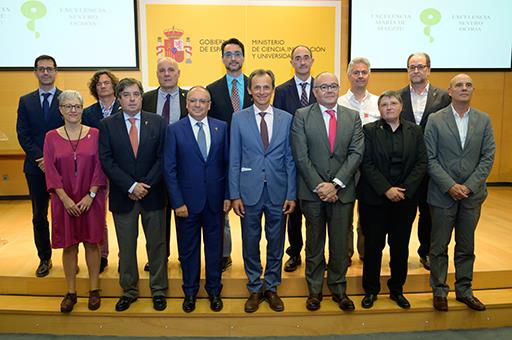
September 10th, 2019
The 9th September the official delivery of these badges to scientific excellence that funds the centers with two million euros over the next four years was celebrated in Madrid.
The acting Minister of Science, Innovation and Universities, Pedro Duque, presided the official act of delivery of the accreditation of excellence to five centers 'Severo Ochoa' and seven units 'Maria de Maeztu' to the most recent winners, among them to the Institute of Physics of Cantabria (IFCA - CSIC, UC). Enrique Martínez, former director of IFCA and scientific director of the María de Maeztu project, collected the distinction granted by the State Research Agency and which recognizes those centers that carry out basic border research and are among the best in the world in their work area.
The programs of excellence Severo Ochoa and María de Maeztu identify and promote excellence in scientific research. Its objective is to promote Spanish science through the recognition of existing avant-garde research centers, also providing support to enhance its impact, international scientific leadership and competitiveness. The accredited centers stand out both for the notoriety of the scientific contributions they make and for their innovative capacity and their intense relationship with the business sector. The IFCA is the only Cantabrian center with this award of excellence.
Selected by a prestigious international evaluation committee, the centers and units chosen stand out for their high competitiveness, their ambitious strategic plans, a high quality scientific production and a great capacity to attract national and international talent. The requirements, levels of demand, criteria and evaluation and selection procedures related to scientific excellence do not establish differences between centers and units, which have been selected for their scientific results and strategic programs after a rigorous evaluation. Thanks to this distinction, they will have funding over the next four years to ensure the level of excellence and scientific leadership at the international level.
The project presented by the Institute of Physics of Cantabria aims to strengthen the recruitment of young talent, enhance the training activities of the two Masters of Excellence UIMP / CSIC-University of Cantabria promoted by the Institute, increase equipment laboratories and encourage participation in new international initiatives led by the IFCA researchers themselves. In addition, it will seek to promote collaboration with companies and the activities of scientific dissemination that are currently carried out in the Center will be consolidated.
The purpose of the meeting at the Ministry was to highlight the impact of the Severo Ochoa - María de Maeztu program, its benefits for the consolidation of excellence research, and its potential as support and trigger for the research poles of the different autonomous communities. On the event, the Institute of Interdisciplinary Physics and Complex Systems (IFISC; Balearic Islands), the Galician Institute of High Energy Physics (IGFAE, Galicia), the Department of Gene Regulation and Morphogenesis (GEM / DCM2, Andalusia) , the Institute of Neurosciences of Alicante (IN; Valencian Community), the Basque Center for Applied Mathematics (BCAM, Basque Country) and the Astrophysical Institute of the Canary Islands (IAC, Canary Islands) presented their case making clear the presence of research of excellence in much of Spanish geography. Accompanying these institutes, the Severo Ochoa - María de Maeztu centers in Cantabria, Madrid and Catalonia also attended and participated in the dialogue with the representatives of the Autonomous Communities.
Taking advantage of the delivery of these accreditations, a working meeting was held between the centers of excellence in the afternoon, grouping in the Alliance of Severo Ochoa centers and María de Maeztu units (SOMMa) and the advisers and authorities of 15 Autonomous Communities.
